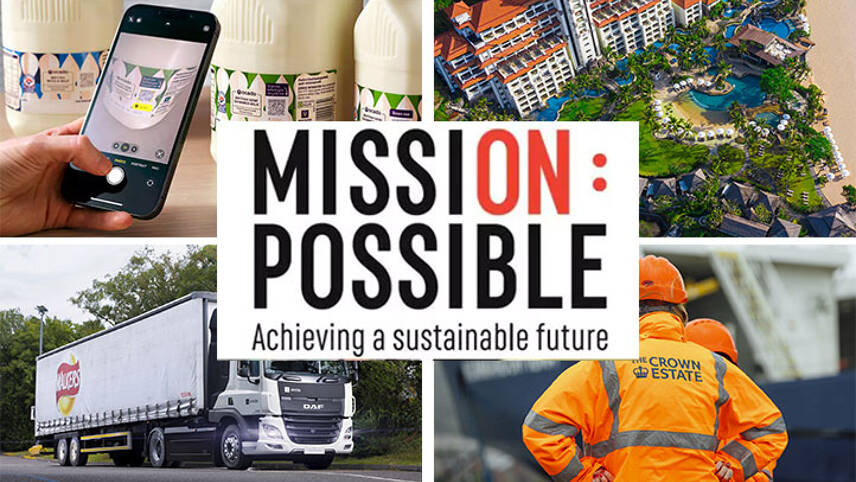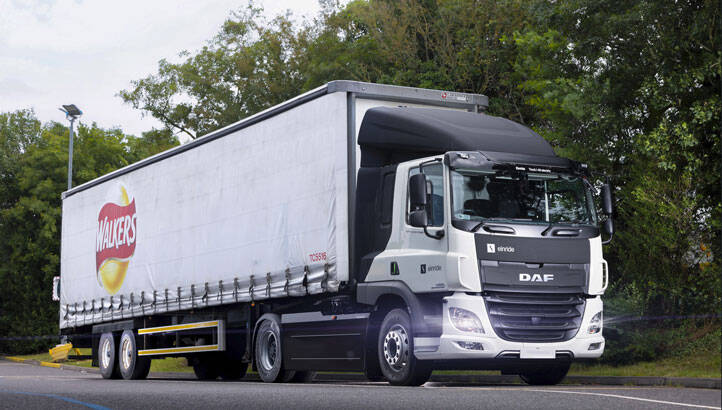Register for free and continue reading
Join our growing army of changemakers and get unlimited access to our premium content

Published every week, this series charts how businesses and sustainability professionals are working to achieve their ‘Mission Possible’ across the campaign’s five key pillars – energy, resources, infrastructure, mobility and business leadership.
Across the UK and across the world, leading businesses, cities, states and regions are turning environmental ambitions into action. Here, we round up five positive sustainability stories from this week.
ENERGY: Wales forges ahead with offshore wind scale-up
Climate deniers at Tufton Street have this week tried to argue that wind energy in the UK is a dead end, because supply chain squeezes prompted Vattenfall to pause one of its three Norfolk Zone offshore projects. But, in the longer term and beyond this one project, the industry and Governments are planning for a major scale-up.
As Wales targets an additional 100MW of renewables capacity by 2026, surveys have begun off the coast of Wales and South West England at the request of the Crown Estate, which leases seabed plots to wind developers. The multi-million-pound project will take around 100 days to complete and map the suitability of plots for wind farms based on wave and wind patterns plus biodiversity data.
The Crown Estates’ head of new ventures Nicola Clay said: “By better understanding the physical and environmental properties of the proposed sites, we are able to help remove some of the barriers and risks developers face when moving through the planning process, while also helping assess and manage any environmental impacts.”
Also this week, the Welsh Government has appointed industry experts from the likes of WSP, Mott MacDonald, LUC, Temple, Dulas, JCTR and Axis to help steer its renewable energy development programme of work. They will collaborate on identifying sites and delivering projects.
RESOURCES: Ocado trials UK’s first digital deposit return scheme
Deposit return schemes (DRSs) encourage recycling by assigning a charge to beverage packaging that is refunded to the customer only when they recycle using verified channels.
With the roll-out of the UK-wide DRS delayed again to 2025, some retailers are forging ahead with their own systems. Among them is Ocado, which has partnered with Polytag and Bower to run what it claims is the UK’s first digital DRS.
Ocado customers can earn a 20p reward by scanning their milk packaging using their phones and taking it to a verified recycling point. The reward will be paid into their digital wallet in the Bower recycling app.
Ocado Retail’s senior packaging and sustainability manager Laura Fernandez said: “We already know that Ocado shoppers have an appetite for such a scheme as when we surveyed them last year, 80% were likely or very likely to scan a QR code for a deposit return.”
MOBILITY: PepsiCo and Royal Mail switch from diesel to used cooking oil for trucks
After celebrating the adoption of its 5,000th electric vehicle (EV) earlier this month, Royal Mail this week laid out plans to switch from diesel to hydrotreated vegetable oil for its heavy goods vehicles at three of its sites. This switch should mitigate the use of 2.1 million litres of diesel before the end of 2023. Read edie’s full story here.
Another business betting on HVO as a drop-in replacement for diesel is PepsiCo. The business first introduced HVO to its fleets in 2022 and, after completing more than 1.5 million km of truck journeys using the fuel, it will use HVO for vehicles operating out of its Leicester site.
This change will impact a further 2.6 million km of truck journeys each year, displacing 800,000 litres of diesel. Further expansion of HVO use is planned for PepsiCo’s transport in Scotland later this year.
“We’re always looking for innovative ways to tackle our carbon footprint and the move to HVO for all our potato deliveries to Leicester, the home of Walkers, is a significant step,” said PepsiCo UK & Ireland’s sustainability director Simon Devaney.
THE BUILT ENVIRONMENT: South London library re-opens after major retrofit
Public buildings like libraries and leisure centres in the UK have been grappling with rising energy prices during the price crisis, with some facing closure and others either self-funding efficiency improvements or seeking Government support.
Peckham Library in London this week reopened after a £1.5m programme of works to improve energy efficiency and end the use of natural gas.
The council has funded the installation of heat pumps, an energy-efficient cooling and ventilation system and energy-efficient lighting. Repaired roofing, windows and flooring will also improve energy efficiency.
Southwark Council’s cabinet member for leisure, Catherine Rose, said the library will serve as a “shining example of green retrofit practices” that could be applied to other council buildings.
BUSINESS LEADERSHIP: Sustainability benchmarking tool launched for hotels
Image: Hilton
It is often said that, in sustainable business, you cannot manage it if you cannot measure it. How will you know what a good carbon target is, or track progress, without a baseline, for example?
To that end, the Sustainable Hospitality Alliance has launched a new benchmarking tool to help its 270+ participating businesses track their own progress and learn from one another. The tool features different frameworks for businesses with mature ESG strategies and those just starting out. It covers topics including water stewardship, climate and human rights.
Frameworks can also be altered by hotels, to account for how material each topic is for their location and size. For example, large hotels in water-stressed regions may want to give more weighting to water.
The Alliance said in a statement that while awareness of the sector’s impacts on society and the environment is increasing, the “overwhelming multitude of general and specialised frameworks makes it challenging to navigate” data management and disclosure.
Alliance chief executive Glenn Mandziuk said that the tool “will continue to align with existing, as well as, upcoming regulations and initiatives, so that the Pathway can continue to serve as a baseline for further developments and standardisation”.







Please login or Register to leave a comment.